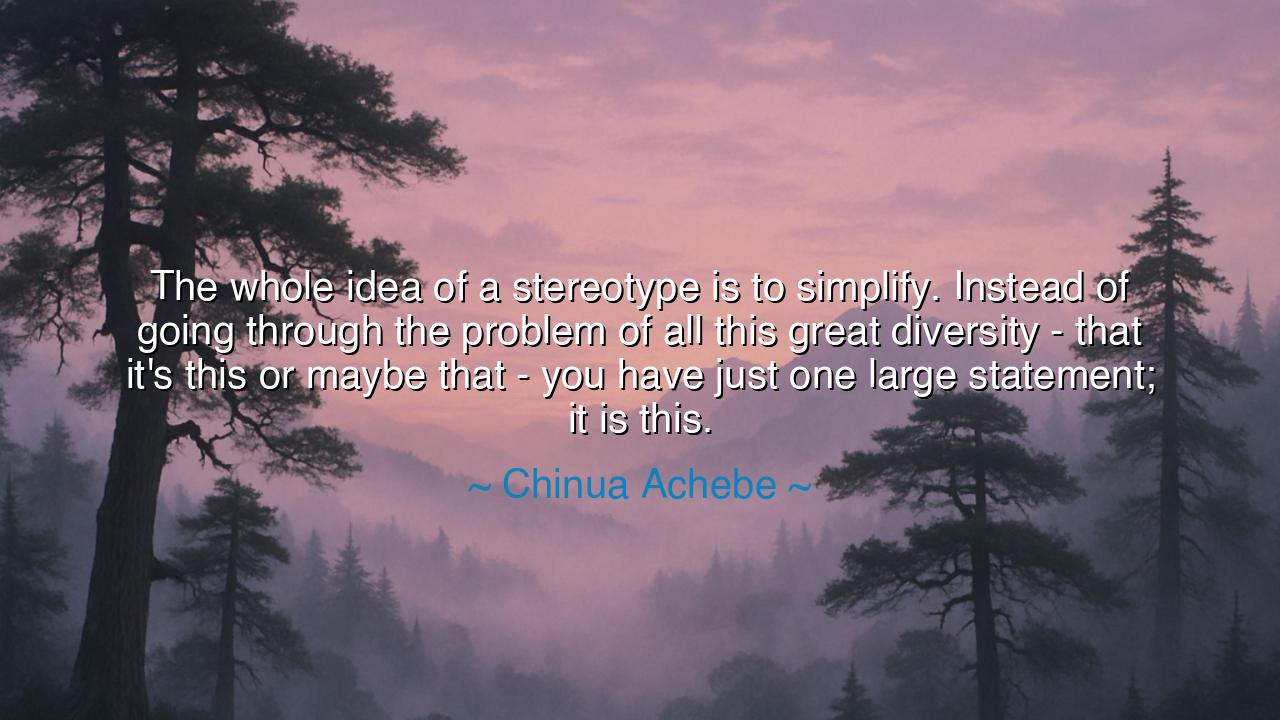
The whole idea of a stereotype is to simplify. Instead of going
The whole idea of a stereotype is to simplify. Instead of going through the problem of all this great diversity - that it's this or maybe that - you have just one large statement; it is this.






Hearken, O seekers of wisdom, and attend to the words of Chinua Achebe, a voice that pierced the veils of preconception and illuminated the truths of humanity: “The whole idea of a stereotype is to simplify. Instead of going through the problem of all this great diversity - that it's this or maybe that - you have just one large statement; it is this.” At first, these words may appear a simple observation on social perception, yet beneath them lies a profound meditation on truth, human complexity, and the peril of reducing life to mere abstraction. The ancients, from Plato to Confucius, understood that the mind seeks simplicity, but that wisdom lies in grappling with nuance and diversity.
Achebe begins with the acknowledgment of the human desire to simplify. To perceive the world in absolutes, to classify and reduce, is natural to the mind; it seeks clarity and certainty amid chaos. Yet in doing so, it risks obscuring the richness and complexity of reality. The Greek tragedians understood this well: when men and women are reduced to archetypes upon the stage, the fullness of character is lost, and the audience sees not truth but shadow. In Achebe’s insight, we find a warning: to embrace simplicity without discernment is to trade knowledge for illusion.
The essence of this wisdom lies in the danger of flattening diversity into a single narrative. A stereotype is not merely a statement; it is a cage for understanding. By asserting, “It is this,” the mind forecloses inquiry, closing the doors through which empathy, insight, and justice might enter. History is littered with such consequences: the Crusades, colonial endeavors, and wars have often been justified by the reduction of complex peoples into singular, often false, depictions. Achebe’s homeland, Nigeria, bore witness to the pernicious effects of stereotyping in the colonial imagination, which ignored the richness of cultures, languages, and governance structures in favor of simplification.
Yet Achebe also teaches that truth demands engagement with complexity. To see the world as it is, to honor its multiplicity, is to accept ambiguity and resist facile conclusions. Socrates, walking the streets of Athens, questioned all assumptions, urging citizens to confront their prejudices and consider the manifold possibilities in every argument. Similarly, Achebe reminds us that to confront stereotypes is to awaken to the fullness of human experience, to perceive not merely the label but the living reality behind it.
Consider the modern example of the civil rights movement in the United States. African Americans were often reduced to a series of caricatures, yet leaders like Martin Luther King Jr., Rosa Parks, and countless others resisted these simplifications, revealing the depth, diversity, and dignity of their communities. Through their courage, they shattered the “one statement” and invited the world to witness the true richness of human identity, validating Achebe’s warning against simplification.
This reflection also illuminates the moral imperative of awareness and humility. To stereotype is not merely an error of intellect—it is a diminishment of humanity. It blinds us to the suffering, joy, and individuality of others. To live wisely, therefore, is to cultivate curiosity, patience, and the willingness to embrace ambiguity, recognizing that every person and every situation contains multitudes beyond what a single statement can convey.
From this teaching emerges a practical lesson: resist the allure of simplistic judgments. Question assumptions, seek stories behind appearances, and honor the complexity of those you encounter. Engage in dialogue, listen deeply, and allow nuance to guide understanding. By doing so, you cultivate both insight and compassion, transcending the limitations of stereotype.
Thus, let it be known: the mind that embraces diversity, that resists the tyranny of “it is this,” nurtures wisdom, empathy, and justice. Do not reduce life to a single statement; honor its multiplicity. Seek understanding beyond labels, for in the richness of complexity lies the true measure of humanity. In this path, you walk as both scholar and sage, discerning not shadows but the living truth that surrounds you.






AAdministratorAdministrator
Welcome, honored guests. Please leave a comment, we will respond soon